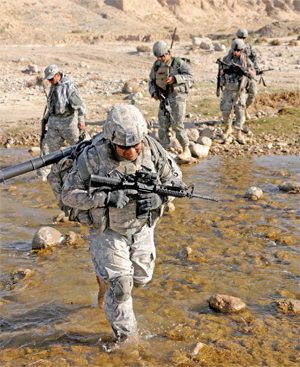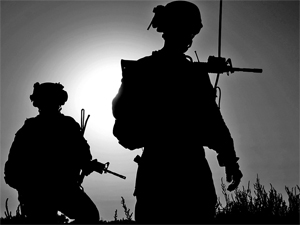Afghanistan: A war with no end
By Saeed Shabazz -Staff Writer- | Last updated: Oct 14, 2010 - 3:18:23 PMWhat's your opinion on this article?
(FinalCall.com) - On Oct. 7, 2001, the invasion of Afghanistan started as a strike-back for the 9-11 terrorist attacks against the World Trade Center in New York City and the Pentagon in Washington, D.C., however, going into its 10th year the war has yet to ameliorate the situation. Observers claim the U.S.-led occupation of

The Obama administration has been trying to convince the American public that the Iraq war is over; and that the war in Afghanistan is winnable. Photo: MGN Online
|
“I'd be very surprised if we are not having this discussion next year,” stated Prof. Stephen Zunes of the Univ. of San Francisco. The professor said that the question being asked in America as the Afghan war reaches the ninth year is that “is this working—is it worth the sacrifice?”
“Look at all of the incredible cutbacks all over the country that disproportionately affect the poor and people of color,” Prof. Zunes explained to The Final Call. “Our government is creating extremists faster than we can kill them,” he said, adding, “In interviews that have been conducted with extremists, when asked what radicalized them, they say, it is because of what we are doing in Afghanistan.”
Other analysts say Obama's “AfPak” war is not a war against terrorism, or for democracy, or to help the long-suffering people of Afghanistan; it is an indefinite, colonial war whose central aim is to turn Afghanistan into a U.S. client state, and ensure that Pakistan remains formerly under Washington's geo-political influence.

U.S. Army Sgt. Manuel Baeza (2nd from left) of Charlie Company, 1st Battalion, 4th Infantry Regiment clasps his carbine as he crosses a river during a reconnaissance mission in Zabul province, Afghanistan, on Oct. 1. Photo: DoD photo by Spc. Joshua Grenier, U.S. Army
|
Congresswoman Barbara Lee (D-Calif.) and a host of her colleagues penned a letter to Pres. Barack Obama asking that he provide Congress with a clear commitment and plan to withdraw U.S. forces from Afghanistan. “It has been a decade since we went to Afghanistan and we still are not sure why we are there,” the Congresswoman stated in her letter. Sen. John McCain (R-Ariz.) also called on Pres. Obama to spell out for the American people what he believes victory in Afghanistan would look like, and to articulate a coherent strategy.
The CATO Institute, a public policy research organization stated back in May that the “question is whether the mission is essential to American national security interests—a necessary component of a broader strategy to degrade al-Qaeda's capacity to carry out another terrorist attack on America—or has it become an interest unto itself (that is, we must win the war because it is the war we are in), rather than asking if the war is winnable, we should ask if the war is worth winning.”
Pres. Obama in an interview with the Canadian Broadcasting Company in February said the war is “still winnable—in the sense of our ability to ensure it is not a launching pad for attacks against North America.”
A U.S. State Dept. spokesperson on Oct. 6, answering a reporter's question on whether a political solution was more likely, said, “That's hard to say, I think that we are comfortable with our strategy. We now have a full complement of military resources on board in Afghanistan.”
“The president approved the strategy that he did last December that we will, for a period of time add to our military in Afghanistan. We will bring this fight to those who are opposing the Afghanistan government,” said the State Dept. spokesperson.
According to The Moderate Voice.com, Sept. 11 provided the pretext for the U.S.A. and its NATO allies with a strategic forward base to project force against other claimants for influence in the region such as Russia, China, India and Iran.
A position paper published by the South Asia Analysis Group on the geo-economic posture by the U.S. concerning the long-term gains and losses for sending in more troops is a smokescreen for America's other ambitions, which is to create favorable conditions for the aspirations of U.S. companies to control major oil and gas projects in Kazakhstan and other Central Asia states; and to build pipelines through Afghanistan.
On the morning of Oct. 7, a cross-section of veterans, community groups, and global justice organizations held a press conference to deliver what they called a united message that the ongoing U.S. military presence in Afghanistan is “bad for Afghan people of all genders, bad for U.S. soldiers, and bad for the people of the U.S.”
A former Afghan parliamentarian Malalai Joya issued a stinging condemnation of Pres. Barack Obama's policies in Afghanistan and how it affects Afghani women. “During Obama's [time in] office the death toll has increased 24 percent as compared to the Bush administration. Their policies are a mirror image of each other,” she said. “Today's situation for women is as catastrophic as it was under the Taliban with rape cases, acid attacks, killing of women increasing rapidly,” Ms. Joya stated.
Iraq Veterans Against the War spoke on the launch of their Operation Recovery campaign, which calls for the right of current service members who are experiencing Post Traumatic Stress Disorder (PTSD), Military Sexual Trauma (MST), Traumatic Brain Injury (TBI), or other forms of trauma caused by past or current deployments to Iraq or Afghanistan to refuse future deployments.
A RAND Corp. study in 2008, estimated that the number of service members with TBI could top 320,000.
The activist veterans spoke about published medical studies in 2008 and 2010 that showed that 20-50 percent of all service members deployed to Afghanistan or Iraq have likely suffered from PTSD. Selena Coppa stated: “Veterans are sick and tired of the never ending occupations. The U.S. military is strained.”
“We are launching a new campaign defending our traumatized brothers and sisters' right to heal without being deployed [for another tour],” Ms. Coppa said.
U.S. deaths in Afghanistan have doubled under Pres. Obama, according to icasualties.org, with 575 dead, since he became president. The web site reports that 1,322 U.S. soldiers have been killed since Oct. 7, 2001; and 5,725 have been wounded.

U.S. Marines Corps Sgt. Ryan McCreary and Capt. Francisco X. Zavala patrol through Trek Nawa, Afghanistan, during Operation Mako, Sept. 21. McCleary and Zavala are assigned to India Company, 3rd Battalion, 3rd Marine Regiment. Mako was on a one-day clearing mission to disrupt enemy activity. Photo: U.S. Marine Corps photo by Sgt. Mark Fayloga
|
Madiha Tahir with the organization Action for Progressive Pakistan and the South Asia Solidarity Initiative speaking as a journalist said what has gone unacknowledged throughout the Afghan war is that there is a war also going on in Pakistan. “This war goes unacknowledged here [in the U.S.] but there are very real costs of it in Pakistan. If the concern of the U.S. is democracy in Pakistan, then it must work with the democratic forces in Pakistan,” she said.
According to reports, the Pakistani military forced at least 2.5 million people from their homes, with the U.S. complementing the assault with almost daily airstrikes on the homes of alleged Pakistani insurgent leaders.
Maritza Bravo, a member of the youth project, Vamos Unidas, spoke out against the DREAM Act, legislation that would grant undocumented youth the opportunity to earn conditional permanent residency if they complete two years in the military, as “reinforcing the militarization of young people in the U.S.”
“The DREAM Act is a de facto military draft, forcing undocumented youth to fight in unjust wars in exchange for a Green Card,” Mr. Bravo opined.
A United Methodist Church member of the general board of Global Ministries, referred to what he termed the longer history of U.S. involvement in Afghan politics, linking it to military spending and the current U.S. presence in the country: “The U.S. will devote this year over $100 billion [to Afghanistan]; almost all of it will go to warfare. The question that we need to ask public officials—what is that money doing to help the well being of Afghanis?”
The Congressional Research Service reports that since the Afghan war started approximately $300 billion of taxpayer money, $101 million per day or $3,947 per family of four has been spent. The president has asked for $65 billion for Fiscal Year 2010, but according to the American Univ. School of International Service in Washington, D.C., it will balloon to $85 billion at $233 million a day.
On Oct. 7 students across the nation on 40 different campuses rallied decrying the spending of trillions of dollars on war and occupation. The protestors said that the money spent on the war could pay for 10 million university scholarships.
Costofwar.com says that the war budget could pay for health care for one million children for one year at a cost of $2.3 billion.
The mayor of Binghamton, N.Y., Matt Ryan stated on Sept. 30 that his city's war tax since Oct. 2001 was $138.6 million, at a cost of $49,650 a day. The Binghamton mayor joins the voices of Chicago Mayor Richard Daley and Boston's Mayor Thomas Menino who question what they call America's “skewed national priorities.”
In the meantime, the U.S. ambassador to the UN, Susan Rice told the UN Security Council on Oct. 1 that Washington was creating the conditions in which Afghanistan could lead the way in controlling their security operations. Her statement seems to run counter to what Pakistan's Pres. Asif Ali Zaidari told the French daily Le Monde that the Afghan war was already lost; and that the U.S. has “underestimated the situation on the ground and was not conscience of the scale of the problem.”
Robert Gibbs, the White House spokesman said Pres. Obama does not see eye-to-eye with Pres. Zardari on the point.
The Iranian news channel PressTV, reported on Oct. 8 that entering the 10th year of the war and occupation “Afghanis blame foreign forces for the violence and insecurity in their nation. A former Afghan prime minister also told PressTV that all Afghanis consider the U.S.-led NATO forces as “invaders”; and if they do not leave the country, there will be no solution and no peaceful time for the forces there.
Related news:
Ignoring bad news won't win Afghan War (FCN, 08-09-2010)
Security Council talks peace, but costly war rages in Afghanistan (FCN, 07-09-2010)
Afghan mineral wealth story raises eyebrows over timing (FCN, 07-01-2010)
Is Oil The Motive For War (FCN, Minister Farrakhan, 02-17-2002)
Afghanistan, the Taliban and the United States (Media Monitors Network, 05-02-2001)
FinalCall.com Exclusive Interview with Taliban Ambassador (FCN, 01-09-2001)
Taliban in Texas for talks on gas pipeline (BBC News, 12-04-1997)
INSIDE STORIES AND REVIEWS
-
-
About Harriett ... and the Negro Hollywood Road Show
By Rabiah Muhammad, Guest Columnist » Full Story -
Skepticism greets Jay-Z, NFL talk of inspiring change
By Bryan 18X Crawford and Richard B. Muhammad The Final Call Newspaper @TheFinalCall » Full Story -
The painful problem of Black girls and suicide
By Charlene Muhammad -National Correspondent- » Full Story -
Exploitation of Innocence - Report: Perceptions, policies hurting Black girls
By Charlene Muhammad -National Correspondent- » Full Story -
Big Ballin: Big ideas fuel a father’s Big Baller Brand and brash business sense
By Bryan Crawford -Contributing Writer- » Full Story






 Click Here Stay Connected!
Click Here Stay Connected!








